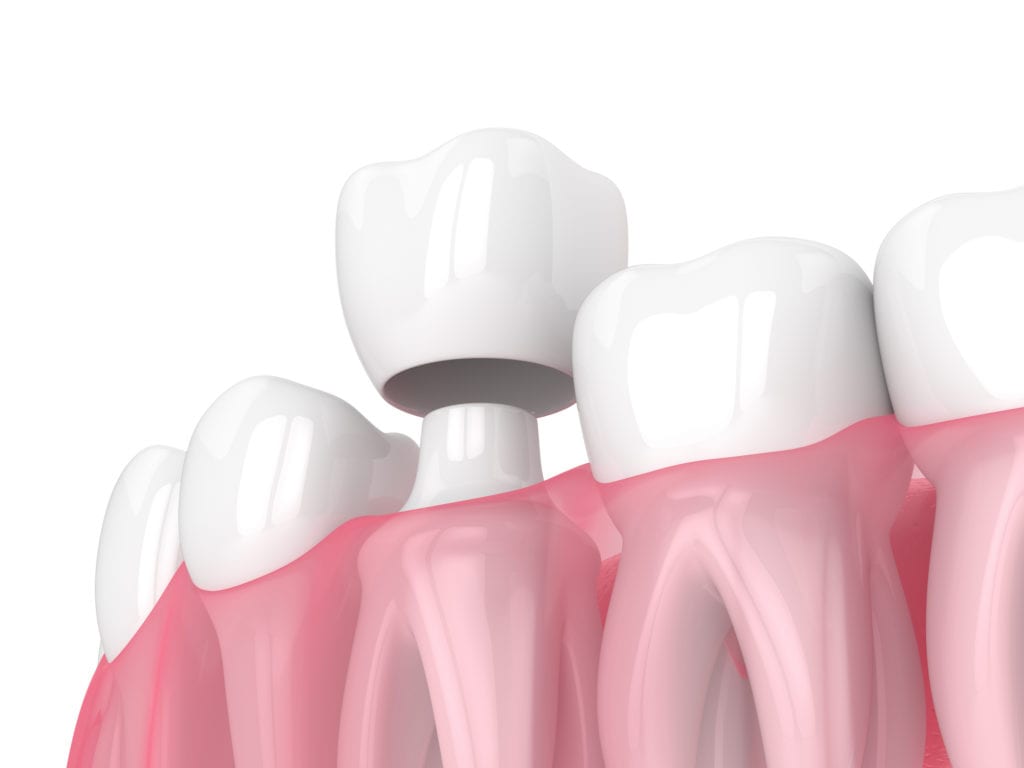Dr. Paul Karpovich provides dental crown procedures to patients with tooth decay or damage in Timonium, MD. Dr. Karpovich works with a U.S. lab to help fabricate custom, comfortable tooth crowns that complement your smile and support your long-term oral health.
A dental crown is designed to cover the whole tooth. Because crowns are durable and long-lasting, they benefit patients receiving dental implants or other restorative dental treatments. Dental crowns may be placed to address cracked or chipped teeth, gaps between teeth, or crooked teeth. Crowns can also replace metal fillings or strengthen teeth after root canal treatments.


Dental Crown Treatment at Paul W. Karpovich, DDS, P.A.
We can help you receive dental crowns in just two to three visits to our dental office. Dr. Karpovich will begin treatment by preparing the teeth that are receiving the dental crowns. He will remove enough tooth structure to support the stable and secure crown placement.
Then, he will take dental impressions of the teeth. These impressions are sent to a U.S. laboratory, where they create models of the teeth and fabricate the crown. The dental crown is permanently secured to your natural tooth using an adhesive resin when complete. We harden the resin with a specialized light.
Types of Dental Crowns
There are a variety of dental crowns with different pros and cons to each:
- Stainless Steel: Temporary dental crowns are usually made out of stainless steel. However, these crowns can help protect your teeth as permanent crowns are being made.
- Precious Metals: Dental crowns created from a metal alloy or mix of silver and gold are highly durable. However, these crowns may not be used for front teeth because they cannot blend in with the color of natural teeth. Metal dental crowns are best for molars in the back of the mouth.
- Porcelain: The most popular type of dental crowns and the kind of crowns that we typically fabricate are porcelain ceramic crowns. Porcelain dental crowns look and feel like natural teeth.
Dental Crown FAQs
Dental crowns are one of the most versatile tools a dentist has. Learn more about them by reading the answers to these frequently asked questions.
What are inlays and onlays?
Like dental crowns, inlays and onlays can replace lost or damaged fillings and fractured teeth. Inlays and onlays are designed in a single layer of porcelain fitted over the area of damage. Onlays cover the cusps, or sides, of the tooth. Inlays fill the area between the cusps. Onlays are also known as partial crowns because they protect a large portion of the tooth.
Is getting a dental crown painful?
We ensure that our patients feel comfortable as possible during treatment. We offer local anesthetic during treatment and will make recommendations for minimizing any discomfort afterward. Most patients experience minimal discomfort and resume their daily activities immediately.
What do I do with a broken dental crown?
Dr. Karpovich can repair or replace a broken dental crown. If you have a broken crown, please contact our office as soon as possible for an appointment. We provide emergency dental care for broken dental crowns and can advise on steps to take at home to minimize damage.
How long does it take to get used to a dental crown?
Any restoration feels a little bit odd in your mouth at first. It’s a foreign structure that your mouth has to adjust to before it accepts it. It usually takes about two weeks for a patient to get used to a dental crown. It will feel big and awkward in your mouth until you adjust properly.
What are my restrictions after getting a dental crown?
Wait to eat or drink for about an hour after the crown is cemented. We want to ensure the cement is cured and the local anesthetic has worn off. Don’t try to eat while your mouth is still numb. Avoid eating anything sticky or chewy for around 24-36 hours. You’ll still have some sensitivity for a few days, too. Slowly reintroduce harder foods as you adjust.
Am I a good candidate for a dental crown?
Dental crowns are often the last resort for teeth that are severely decayed or damaged. We have to ensure that the tooth is still salvageable. There are instances of too much damage or decay, or infection has spread to the gums and bone.
Schedule a Dental Consultation Today
Do you want to protect weak or injured teeth? Try treatment with dental crowns. Call Dr. Karpovich today at (410) 221-3085 or request an appointment with him on our website.
